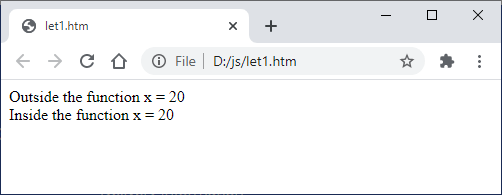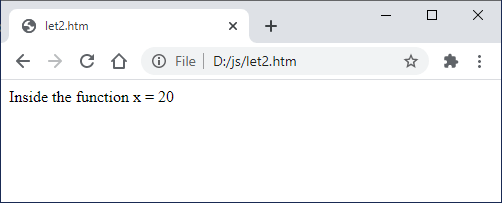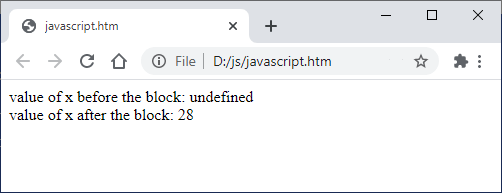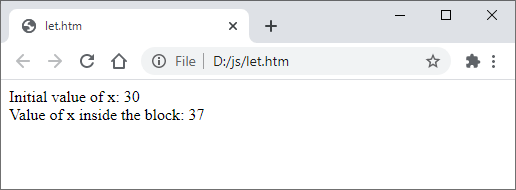JavaScript let 关键字
在JavaScript中, let是一个关键字 ,用于声明一个块级作用域变量。通常使用 var关键字 来声明一个在JavaScript中视为普通变量的变量,但使用let关键字声明的变量是块级作用域的。
JavaScript提供了三种声明变量的方式: var,const, 和 let 。 这些关键字提供了不同的功能。var是一种传统的声明变量的方法,而 const 和 let关键字 是ES2015/ES6之后引入的,用于创建 块级作用域变量 。
在JavaScript中,以前只有两种变量作用域: 全局作用域 和 函数作用域 。
let的语法
以下是使用 let关键字 声明一个变量的语法:
let variable_name;
示例
以下是各种示例,用于帮助您了解let变量在块或函数内外的工作原理。这些是使用let在不同作用域中声明变量的简单示例。
示例1:全局作用域
在这里,您可以看到在主体或函数外部声明的变量具有全局作用域。因此,它可以从函数内外的任何地方访问。
<script>
let x =20;
document.write("Outside the function x = " + x);
function show(){
document.write("<br> Inside the function x = " + x);
}
show();
</script>
输出
Outside the function x = 20
Inside the function x = 20
截图
这是上述程序的网页输出:

示例2:函数作用域
在这个示例中,你将看到一个在函数内部声明的变量只有函数作用域。因此,它不允许在函数外部访问。
<script>
function show(){
let num = 15;
document.write("Inside the function num = " + num);
}
show();
document.write("<br> Outside the function num = " + num);
</script>
输出
在这里,您会看到只有函数内的第一个语句被打印出来,第二个语句没有显示出来。它将 num is undefined 视为函数作用域之外的内容。
Inside the function num = 15
截图
这是上述程序的网页输出:

查看上述程序的控制台输出,以了解为什么第二个语句没有打印。在您的浏览器中,点击三个点并转到 **更多工具 – > 开发者工具 -> 控制台 ** ,并在控制台中查看以下错误:
UncaughtReferenceError: num is not defined
示例3:块级作用域
在这个示例中,你会发现在块内声明的变量不能在块外使用,因为它具有块级作用域。
<script>
{
let num = 30;
document.write("Inside the function num = " + num);
}
document.write("<br> Outside the function num = " + num);
</script>
输出
在这里,只有块语句会显示使用 let 关键字声明的 num 变量的值。第二个语句不会显示 num 变量的值。
Inside the function num = 30
屏幕截图
这是上述程序的网页输出:

查看上述程序的控制台输出,以了解为什么第二个语句没有打印出来。在您的浏览器中,点击三个点,进入 更多工具 – > 开发者工具 -> 控制台,然后在控制台中查看下面所示的错误:
UncaughtReferenceError: num is not defined
示例4:在不同的代码块中重新声明变量
在这个示例中,我们会在不同的代码块中声明一个具有相同名称的变量,并显示其值。
<script>
let num = 23;
{
let num = 15;
document.write("num inside the function = " + num);
}
let num = 89;
document.write("<br> num outside the function = " + num);
</script>
输出
在执行上述代码时,由于不允许使用let变量重新声明,因此会生成一个错误。因此,在浏览器上不会显示任何输出。
截图
这是上述程序的空白Web输出:

如果您看到控制台输出,这将显示执行此程序时生成的错误。
SyntaxError: redeclaration of let x
note: Previously declared at line 2, column 5
let和var关键字有什么不同
在下面的示例中,你可以看到使用let关键字和var关键字声明的变量具有不同的变量作用域和能力。
let和var的主要区别在于它们的作用域。var具有全局作用域,而let具有块级作用域。请看以下示例来了解这个区别:
变量作用域
在这些示例中,我们将展示使用var和let声明的变量的作用域。
Var:全局作用域示例
<script>
function checkGlobalScope() {
// x is declared yet so not available here
document.write('Value of x before the block: ' + x);
{
var x = 20;
x = x + 8;
}
// x is still known here and has a value.
document.write('<br> Value of x after the block: ' + x);
}
//x is declared inside the function, so not available here
checkGlobalScope()
</script>
输出
Value of x before the block: undefined
Value of x after the block: 28
截图
查看上面程序的Web截图:

let:块级作用域示例
<script>
function checkBlockScope() {
{
let x = 30;
// initial value of x will print here
document.write('Initial value of x: ' + x);
x = x + 7;
// updated value of x will print
document.write('<br> Value of x inside the block: ' + x);
}
// the value of x will not print here
document.write('<br> Value of x outside the block: ' + x);
}
checkBlockScope()
</script>
输出
Initial value of x: 30
Value of x inside the block: 37
截屏
查看上述程序的网页截图:

这些示例将向您展示在使用var和let关键字声明变量时,变量在块内外部具有不同的作用域。
循环作用域
在这些示例中,我们将向您展示使用var和let声明的变量的作用域。
let:循环作用域示例
<script>
function checkLoopScope() {
let i = 4;
for (let i = 0; i < 10; i++) {
// some statements
}
// x is still known here and has a value.
document.write('Final value of x outside of the loop: ' + i);
}
checkLoopScope()
</script>
输出
在这里,您会看到i的初始值将显示,因为使用let关键字不允许重新声明。
Final value of x outside of the loop: 4
截图
查看上面程序的网页截图:

var:循环范围示例
<script>
function checkLoopScope() {
var i = 4;
for (var i = 0; i < 10; i++) {
// some statements
}
// updated value of i will display
document.write('Final value of x outside of the loop: ' + i);
}
checkLoopScope()
</script>
输出
这里,你会看到因为使用var关键字允许重新声明,所以会显示i的更新值。
Final value of x outside of the loop: 10
Screenshot
查看上述程序的网页截图:

重新声明
查看下面的示例以理解哪个变量声明是允许的,哪个是不允许的。使用var关键字可以在程序的任何位置进行变量声明。
示例1
var num = 6;
//num is 6 here
var num = 3;
//num is 3 here
示例2
var num = 6;
let num = 2; //redeclaration is not allowed using let
示例3
let num = 6; // allowed
let num = 2; // not allowed
示例4
let num = 61; // allowed
{
let num = 29; // allowed
}
{
let num = 37; // allowed
}
 极客笔记
极客笔记